It's been a disturbing summer.
"In June, floods occurred in many parts of southern China and Jiangnan, and high temperatures of 40°C were recorded in Henan, Hebei and Shandong.
As of July 12, a total of 71 meteorological stations in China had daily maximum temperatures exceeding historical extremes, and many people in Zhejiang, Sichuan and Jiangsu were diagnosed with pyrexia.
In the most severe cases of heat stroke, nurses in protective clothing fainted while working long hours outside at 38°C, and a 56-year-old worker collapsed on his way to work after nine hours of hot work.
As the world cools and heats up, a deadly heat wave is also sweeping through Europe, setting new record high temperatures and disrupting what should be a normal life.
High temperature warnings, wildfires rage as Europe blows up with heat
On 19 July local time, the highest temperature in the UK topped 40C for the first time, with the previous highest temperature in the UK being 38.7C in 2019.
Heathrow was the first place to break the 40C mark, with temperatures of 40.2C monitored at midday local time on 19 July, before 40.3C was recorded in Coningsby, Lincolnshire.
From Surrey to South Yorkshire, temperatures ranged from 39C to 40C across a large swathe of eastern England, with at least 34 weather stations setting records.
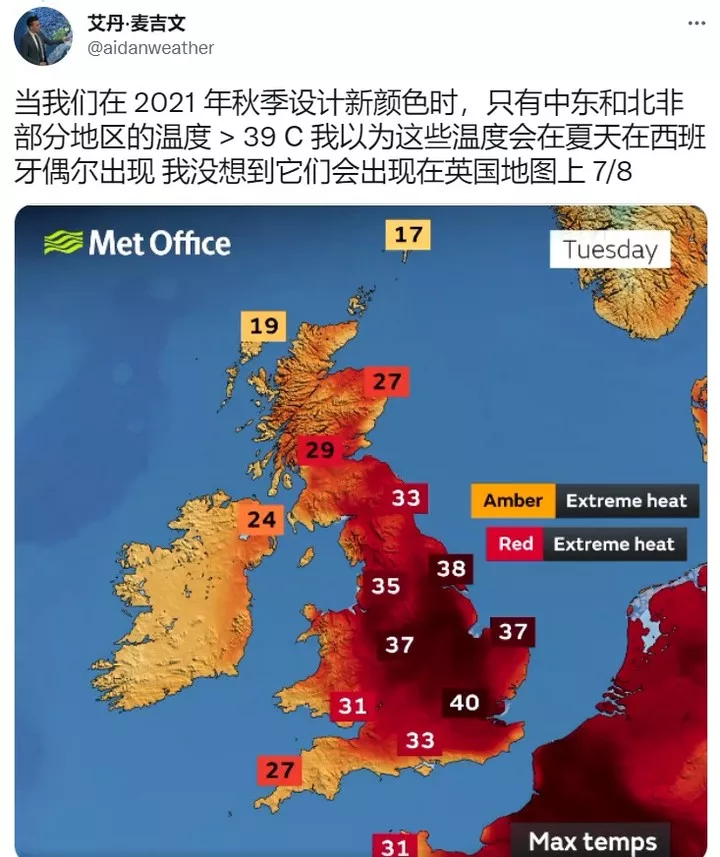
People are working from home on Monday and Tuesday, using public transport only when necessary, with temperatures only expected to drop on Wednesday under the UK government's first ever 'red extreme heat warning'.
These figures may not seem surprising to us, but the UK is a country known for frequent showers, mild weather, heating rather than cooling, and is unprepared for such extreme heat.
The high temperatures were followed by raging fires.
In the village of Winnington, a suburb of east London, black smoke rolled in and destroyed a number of houses as 15 fire engines and about 100 firefighters responded to the blaze; two people were taken to hospital for treatment for smoke inhalation after a fire in the east London suburb of Dagenham; and further north, in the town of Milton Keynes, a nursery was caught in a blaze.

▲ Image from: BBC
Due to the risk of fire, the government is reminding people not to barbecue or swim in the wild and to be careful about extinguishing smoke.
Extreme temperatures have likewise affected traffic.
Luton Airport in the UK was shut down for a time on the afternoon of 18 local time due to a defective part of the airport runway caused by the hot weather; the British Air Force also suspended aircraft take-offs and landings at its largest base because "the runway may have melted"; and as tracks in the heat risk of buckling, speed restrictions began on most of the rail network's routes.

Transport Secretary Grant Shapps has stated that the UK's rail network cannot cope with extreme heat and will need 'many years' of upgrades to cope with hotter climates.
Most of the London Underground, which has no air-conditioning facilities, is like a 'sauna' and has also suspended its services.

Water companies in the south and east of England have warned that increased demand has led to lower water pressure and even supply disruptions in some homes.
In addition, Google Cloud Services and Oracle's servers in the UK suffered cooling-related downtime, with both companies blaming the unexpected shutdown on the heat.
Outside the UK, extreme heat is also baking much of Europe and North Africa.
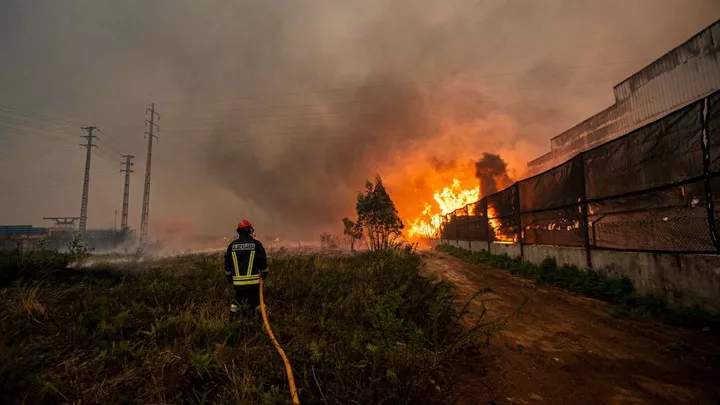
▲ Image from: ft
Wildfires broke out in France, Spain, Portugal, Greece, Morocco and Croatia.
Axios reports, 678 people died in Spain from July 10 to July 17, when high temperatures ranged from 39°C to 45°C, and in Portugal from July 7 to July 18, when In Portugal, 1063 people were killed by the heat wave between 7 and 18 July.
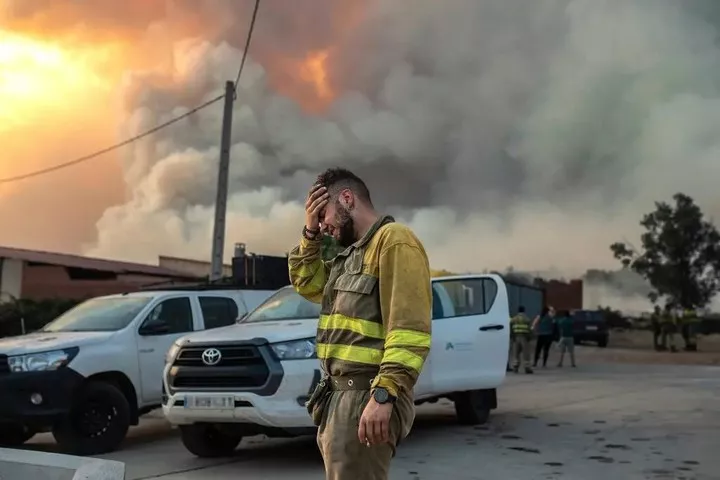
▲ Spain. Image from: AP
Paris climbed to 41°C at one point as people took refuge in the city's subway, under trees in parks and around fountains.
Greek authorities have instructed people to evacuate four areas near Punteli in eastern Athens, where smoke and flames can be seen due to forest fires.
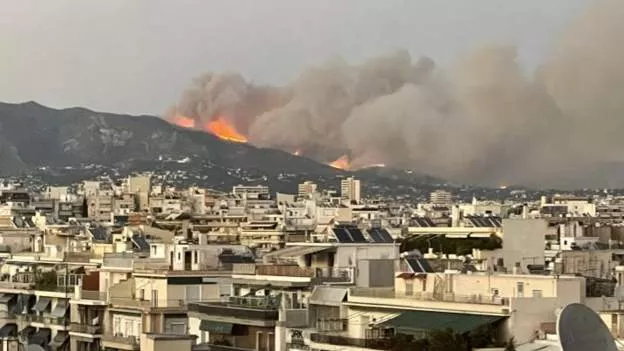
▲ Greece. Image from: BBC
Surviving a summer without air conditioning
"Stay where it's cool," might be a good blessing this summer.
There is perhaps no better way to mark the arrival of summer than to fast forward past the heat of an air conditioner's outside unit and then enter a room to welcome the cool breeze.
But not for Europe.
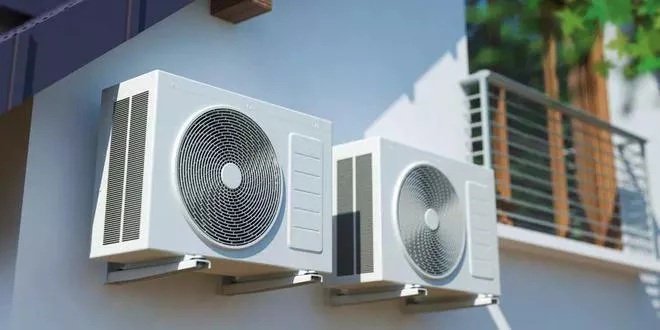
According to a report by the UK Department for Business Energy and Industrial Strategy 2021, less than 5% of UK households have air conditioning installed, with around half of cooling demand coming from offices, followed by retail outlets and hospitals.
One of the main reasons is that it is not "cost effective". Many countries in Europe are located above 40 degrees north latitude, and even in summer it rarely exceeds 30 degrees Celsius. In the south of France, such as Cannes, there are more air conditioners installed.

▲ Image from: PA Media
British homes are not even designed to cope with summer at all. Tadj Oreszczyn, a professor at University College London, notes, "We are a heating-based country, not a cooling-based country."
For example, in some older buildings, hot water pipes running through hallways may be uninsulated, and hot water for showers spreads heat throughout the apartment, which overcomes cold winters only to exacerbate the threat of heat waves.
But with the heat wave that has swept through Europe in recent years, the popularity of air conditioning remains low. Because of the high expenses and installation hassles, the desire to install air conditioners is also unavailable.

▲ Image from: euronews
Knowing user @Faiwai ash to get up ash had an air conditioner installed in France, and to install it (an indoor unit plus outdoor unit), not only did you have to pay for the machine, but you had to hire a company with a professional air conditioner installation certificate to buy parts and install the equipment. The price of the machine, installation and commissioning fees added up to an average expenditure of about 2500 Euros, and the minimum wage in France was only 1200 Euros.
What's more problematic is that if you live in a place with a homeowners' association, such as a condominium, you must vote at a homeowners' meeting to discuss issues such as whether the discussion will be noisy to neighbors, affect the aesthetics, or harm the building, and more than half agree before you can install it.

▲ Photo from: Xinhua News Agency
In the summer of 2019, the sales staff of the French department store Bashway Electrical sold just over 350 air conditioners, basically all mobile air conditioners. This is because these air conditioners do not require a license and cost around 450-900 €.
However, public places such as the Louvre, libraries, supermarkets and larger restaurants are air-conditioned.
The UK also has strict requirements for air conditioning installations, which are not allowed to be installed on the surface of a building. This means that the air conditioner must be installed on the roof or on the ground, requiring the addition of extended copper piping that costs even more than the price of the air conditioner.
In addition, in Germany, a 1.5 hp air conditioner costs more than 700 Euros, installation costs 1100 Euros, and the electricity bill is a huge expense, about 0.3 Euros per degree, which means that the average person earns just over 2000 Euros a month.
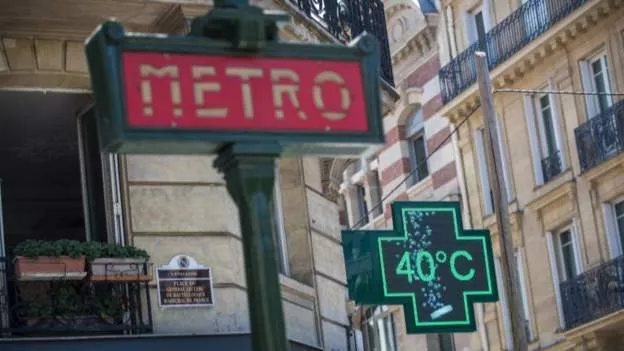
▲ Image from: EPA
Of course, while using the air conditioner, the climate problems that it may cause need to be taken care of.
According to a 2018 report published by the International Energy Agency, greenhouse gas emissions from coal- and natural gas-fired power plants that power air conditioning units will nearly double by 2050, and these emissions will contribute to global warming, potentially further exacerbate the need for air conditioning.
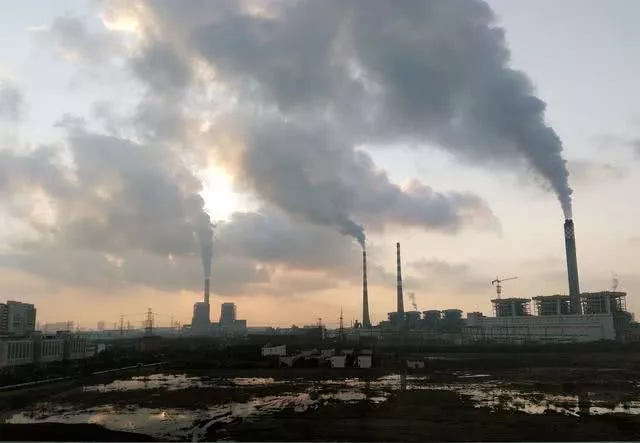
▲ Image from: climatechangenews
The UK government has also pointed out that rising temperatures, driven by climate change, could increase demand for cooling systems that consume significant amounts of energy and could run counter to the UK's goal of reducing net greenhouse gas production to zero by 2050.
But when the heat is unbearable, not using your air conditioner can be fatal.
That is why some scientists believe that the solution is not to convince countries to stop using air conditioners, but to make them more energy efficient, such as setting energy efficiency standards for air conditioners, phasing out refrigerants, etc.
"Hottest summer ever" has been set time and time again, and where is this heat wave coming from?
It's no surprise that climate change is causing temperatures to rise, and we've been brushing off 'the hottest summer ever' almost constantly.
Scientists note that the frequency and intensity of heat waves in Europe are increasing faster than 'almost anywhere else' on Earth.
Global warming is naturally a well-known cause.
Because of emissions of carbon dioxide and other greenhouse gases, the average temperature is now about 1.1°C warmer than it was in the late 19th century.

▲ Image from: Unsplash
Global warming doesn't just mean a higher 'starting point' for temperature extremes; it affects atmospheric and oceanic circulation.
Columbia University researcher Kai Kornhuber has found that the increased frequency and intensity of heat waves in Europe over the past 40 years is linked to changes in the jet stream, with many heat waves occurring when the stream temporarily splits in two, 'leaving areas of weak winds and high pressure air between the two branches, which facilitates the build-up of extreme heat'.
At the same time, one of the world's major ocean currents, the Atlantic Meridional Overturning Circulation (AMOC), is also changing.
In 2021, Dr. Efi Rousi, a senior scientist at the Potsdam Institute for Climate Research in Germany, showed through computer simulations that as the world warms, weakening ocean currents can lead to changes in atmospheric circulation, making European summers drier.

▲ Image from: guardian
The persistence of heat waves in Europe may also be related to the fact that the Arctic is warming at a faster rate: the temperature difference between the Arctic and the equator decreases, which leads to a decrease in summer winds and thus a longer lasting weather system.
According to a recent expert study, heat waves occur on average three times more frequently now than before industrialization and can be 1.2°C warmer.
Stephen Belcher, head of science and technology at the UK Met Office, said that if high emissions continue, 'we could see a heatwave like this every three years'.
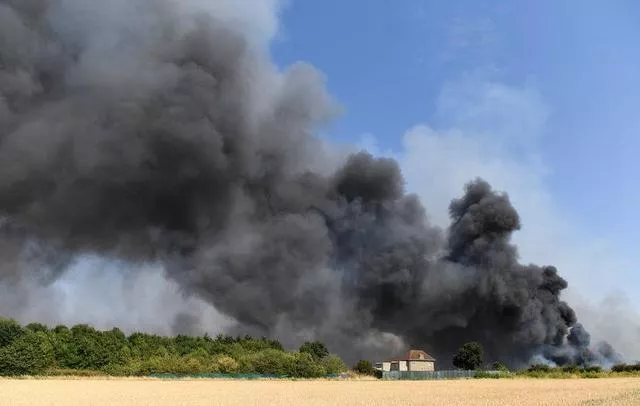
'Heat' is an 'annual' topic, and it seems like every year we see news like "hottest summer ever," "record breaking heat," "blown away by heat." ......
There is often skepticism about warming - is it man-made, or just natural evolution?
In August 2021, the United Nations Intergovernmental Panel on Climate Change (IPCC) released a climate change report that states that climate warming is about 95-100% due to human activities and about 0-5% due to natural factors.
If warming breaches the 1.5°C 'safety line' set by the Paris Agreement, it will be catastrophic for many countries, with extreme heat events becoming more frequent, longer lasting and more intense.

▲ Image from: Reuters
At Monday's Petersburg Climate Dialogue , UN Secretary-General António Guterres made his position on the climate crisis clear - countries must act now.
Half of humanity is in the danger zone of floods, droughts, extreme storms and wildfires. No country is immune. Yet, we continue to meet our dependence on fossil fuels. What bothers me most is that in the face of this global crisis, we have failed to work together as a multilateral community .......
Your Excellencies, this must be the decade of decisive climate action, which means trust, multilateralism and cooperation. We have a choice, collective action or collective suicide, and it is in our hands.